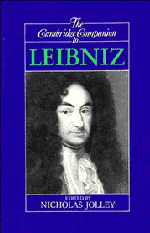Book contents
- Frontmatter
- 1 Introduction
- 2 G. W. Leibniz, life and works
- 3 The seventeenth-century intellectual background
- 4 Metaphysics: The early period to the Discourse on Metaphysics
- 5 Metaphysics: The late period
- 6 The theory of knowledge
- 7 Philosophy and logic
- 8 Philosophy and language in Leibniz
- 9 Leibniz
- 10 Leibniz's ontological and cosmological arguments
- 11 Perfection and happiness in the best possible world
- 12 Leibniz's moral philosophy
- 13 The reception of Leibniz in the eighteenth century
- Bibliography
- Index
13 - The reception of Leibniz in the eighteenth century
Published online by Cambridge University Press: 28 May 2006
- Frontmatter
- 1 Introduction
- 2 G. W. Leibniz, life and works
- 3 The seventeenth-century intellectual background
- 4 Metaphysics: The early period to the Discourse on Metaphysics
- 5 Metaphysics: The late period
- 6 The theory of knowledge
- 7 Philosophy and logic
- 8 Philosophy and language in Leibniz
- 9 Leibniz
- 10 Leibniz's ontological and cosmological arguments
- 11 Perfection and happiness in the best possible world
- 12 Leibniz's moral philosophy
- 13 The reception of Leibniz in the eighteenth century
- Bibliography
- Index
Summary
Leibniz claimed to be proud of the fact that, during his lifetime, he had no school, no disciples, and no popularizers. He despised, he said, the sectarian spirit which he associated with the Cartesians. Whether this attitude did not hide a kind of disappointment in the end is open to question. Leibniz was widely admired as a diplomat, a man of learning, and as a mathematician. But he was not, during his lifetime and long afterwards, considered a great philosopher, and after the deaths of Sophie Charlotte, the Queen of Prussia, in 1705, and her mother, the Ellectress Sophie, in 1714, no one showed an intense interest in his metaphysical theories. The dispute with Newton and the Royal Society, followed by the increasingly agitated argument with Newton's representative Samuel Clarke, threw a pall over Leibniz's last two years. Newton, never a gracious opponent, is said to have boasted that he killed Leibniz.
- Type
- Chapter
- Information
- The Cambridge Companion to Leibniz , pp. 442 - 474Publisher: Cambridge University PressPrint publication year: 1994
- 11
- Cited by

